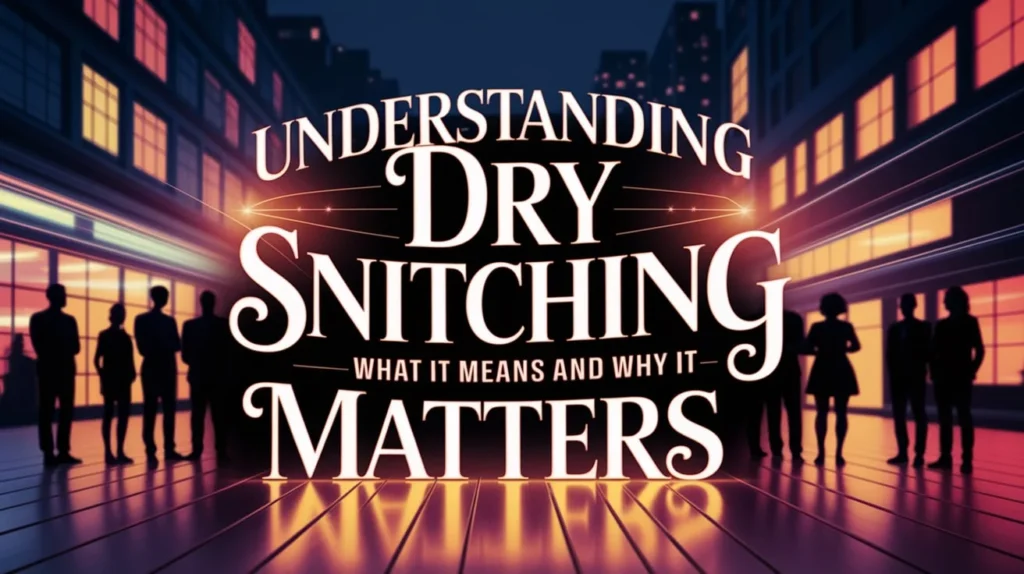In today’s world, slang has become an integral part of how we communicate. From social media to everyday conversations, it’s nearly impossible to avoid the influence of modern-day jargon. Among these slang terms, one that has gained significant traction over time is “dry snitching.”
While it may sound like just another passing trend, the concept behind dry snitching is much more complex than it first appears. But what does it mean? Why does it hold such weight in social and even professional settings?
This article dives into the concept of dry snitching, examining its true meaning, origin, cultural relevance, and why it matters today. We’ll also explore how to avoid this behavior and how it can affect trust in your relationships.
By the end, you’ll have a comprehensive understanding of this term and the impact it can have on both personal and professional environments.
What Is Dry Snitching?
At its core, dry snitching refers to the act of disclosing sensitive or private information about someone, often unintentionally, in a way that could harm them without directly implicating them in any wrongdoing.
The key difference between snitching and dry snitching is that the latter involves revealing information that doesn’t explicitly call out or accuse someone but still has the potential to cause damage, betrayal, or embarrassment.
Imagine a situation where a group of friends is planning a surprise party for one of them. One friend casually mentions, in front of the guest of honor, the plans they’ve made. Although no one was directly “snitched on,” the surprise is ruined.
This is dry snitching in action – unintended disclosure that disrupts a situation and violates trust.
Dry snitching typically involves sharing information that others might consider private or confidential.
The information may be disclosed in the context of a conversation where the person isn’t necessarily trying to betray someone but does so because they fails to realize the impact of their words.
Origins of the Term ‘Dry Snitching’
Like many slang terms, dry snitching has roots in urban culture, particularly in communities where loyalty and trust are held in high regard.
The phrase likely emerged from the broader concept of snitching, which has long been associated with betraying someone’s trust by providing information to authorities, law enforcement, or other third parties in exchange for personal benefit or protection.
While snitching involves directly implicating someone or revealing something that could get them into trouble, dry snitching differs in that it doesn’t necessarily lead to direct consequences. However, it still carries significant weight because it subtly breaches trust or confidentiality.
Over the years, the term “dry snitching” has evolved and spread to various contexts, including workplaces, friendships, and social groups, where the emphasis is less on legal consequences and more on the emotional and social repercussions of disclosing sensitive information.
Examples of Dry Snitching
Understanding dry snitching becomes easier when you examine real-life examples. These scenarios help illustrate how a seemingly innocent comment or action can be considered dry snitching.
Example 1: The Gossip in the Office
Let’s say that in your office, there’s a colleague who’s been struggling with meeting deadlines. One day, someone casually mentions in a team meeting that “someone might be a bit behind on the project.”
Though the person didn’t specifically say who is struggling, the comment immediately points fingers at the person in question.
Here, dry snitching occurs when the information is shared in a general way, but everyone knows who is being talked about. The unintended harm comes from the loss of that person’s privacy and the social implications of the disclosure.
Example 2: Revealing Personal Secrets in Social Circles
Imagine you’re out with a group of friends, and one person, in passing, talks about how another person is dealing with a breakup or family issues.
Although the information wasn’t shared with the intent to hurt anyone, it still makes the person whose situation is being discussed feel exposed or vulnerable. In this instance, dry snitching takes place because private information was revealed to a wider audience without the person’s consent.
These examples underscore the importance of being mindful about what you share and with whom. Even without malicious intent, dry snitching can damage relationships or create tension.
Why Dry Snitching Is Harmful
Now that we have a clearer understanding of what dry snitching is and how it can manifest in everyday situations, let’s dive deeper into why this behavior is harmful. Dry snitching might seem like a harmless slip of the tongue, but its effects can be far-reaching and damaging.
Betrayal of Trust
One of the most significant consequences of dry snitching is the breach of trust. Trust is a fragile thing. Whether it’s a friendship, a workplace relationship, or a romantic partnership, trust is the foundation upon which those relationships are built.
When someone reveals private information without consent, it can feel like a betrayal, even if no ill intent was present.
For example, imagine sharing something deeply personal with a close friend, only to find that your vulnerability is later discussed in a group setting.
This type of action, even though it may not have been done with malicious intent, can shatter trust and potentially end the relationship.
Unintended Consequences
Dry snitching can also lead to unintended consequences. Often, the person who shares the information doesn’t think about how their words will be received or the repercussions they might cause. However, once the information is out there, it’s impossible to take back.
Consider a scenario where someone is dry snitching in a workplace setting. Perhaps they mention that a colleague is struggling with personal issues, but they don’t specifically name the person.
While it may seem harmless, it can lead to rumors, unwarranted judgment, or even workplace gossip that harms the individual’s reputation.
How to Avoid Dry Snitching
It’s important to be aware of how your words affect others and to practice discretion in what you share. Here are some strategies to avoid falling into the trap of dry snitching:
Maintain Boundaries
One of the most effective ways to avoid dry snitching is to maintain healthy boundaries with others. Know what is appropriate to share and with whom. Respecting privacy is a key aspect of maintaining trust in any relationship.
For example, if a friend tells you something personal in confidence, consider whether it’s appropriate to share it with others—even if no one is specifically asking for details.
Improve Communication Skills
Learning how to communicate effectively and without over-explaining is another way to avoid dry snitching. Being mindful of what’s shared and how it’s shared can prevent unnecessary disclosures that may harm others.
In conversations, try to focus on being concise and respectful, especially when discussing someone else’s personal life or struggles.
Recognize the Value of Silence
Sometimes, the best approach is to simply keep quiet. There’s no need to fill every silence with information. If you find yourself in a situation where you might accidentally disclose something private, take a moment to consider the impact your words might have.
Why People Do It
Now that we’ve covered the harm caused by dry snitching and ways to avoid it, it’s essential to explore why people might do it in the first place. Understanding the motivations behind dry snitching can shed light on how to prevent it.
Lack of Awareness
One of the main reasons people engage in dry snitching is that they may not be fully aware of the impact their words have. They might think they’re simply sharing harmless information or that they’re being open about something.
However, they fail to realize that certain details are private or sensitive and should be kept confidential.
Gaining Favor or Social Leverage
Another reason why someone might engage in dry snitching is to gain favor or social leverage. For example, someone may reveal information in an attempt to win over a group or fit in.
In these cases, the person may not even realize that their words are causing harm—they’re simply trying to gain attention or approval.
Dry Snitching in Pop Culture
Dry snitching has found its way into pop culture, where it’s often portrayed in movies, music, and television shows. The way it’s depicted in these media can influence how we view it in real life.
For example, some hip-hop artists have referenced dry snitching in their music, often as a way to describe betrayal or disloyalty. Movies and TV shows may use it as a plot device to create conflict or tension between characters.
These portrayals can shape how the public understands the concept of dry snitching and, in some cases, might even make it seem less harmful than it actually is.
The Line Between Dry Snitching and Being Honest
It’s important to recognize that honesty is a virtue, and being transparent with others is often necessary for building trust. However, there’s a fine line between being honest and accidentally disclosing something that should be kept private. Understanding this distinction is crucial for maintaining healthy relationships.
For example, honesty becomes problematic when it compromises someone’s privacy or when it’s shared inappropriately. Knowing when to hold back certain details is key to avoiding the pitfalls of dry snitching.
Conclusion
In conclusion, dry snitching is more than just a passing slang term—it’s a behavior that can cause significant harm in relationships, workplaces, and social circles. Understanding what dry snitching is, why it happens, and how to avoid it will help you maintain better, more trustworthy relationships.
Whether in your personal life or at work, respecting boundaries and being mindful of the impact of your words will ensure you don’t accidentally betray someone’s trust. By recognizing the signs and effects of dry snitching, you can foster more authentic and respectful connections with those around you.
FAQs
1. Is dry snitching the same as snitching?
No, dry snitching involves unintentionally revealing sensitive information without directly implicating someone, while snitching involves deliberately providing information to authorities or other figures.
2. Can dry snitching happen accidentally?
Yes, dry snitching often happens without malicious intent. People may not realize that they’re sharing information that could harm someone.
3. How can I tell if someone is dry snitching?
Dry snitching occurs when private information is disclosed in a way that damages someone’s reputation or breaches trust, even if no one is directly called out.
4. What’s the difference between dry snitching and gossiping?
Gossiping typically involves spreading rumors or discussing someone’s personal life with others, while dry snitching focuses on accidentally revealing private details that could lead to consequences.
5. Is dry snitching ever justified?
In certain situations, dry snitching may be justified if it serves the greater good. However, respecting privacy and knowing when to remain silent is essential in maintaining trust.

Shin Kyung is a passionate numerologist and spiritual guide dedicated to exploring the profound meanings behind angel numbers. With a unique blend of intuition and research, Shin empowers readers to unlock the hidden messages from the universe and embrace their spiritual journeys.



